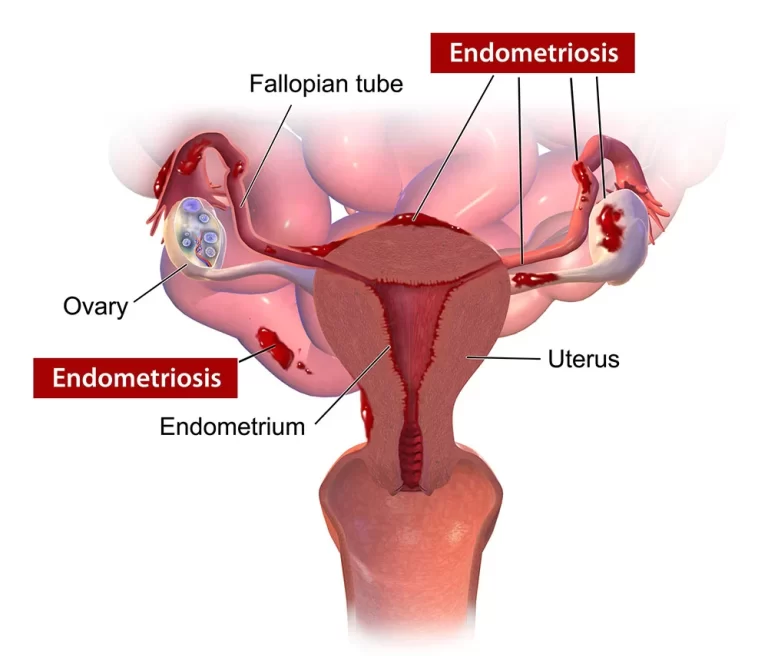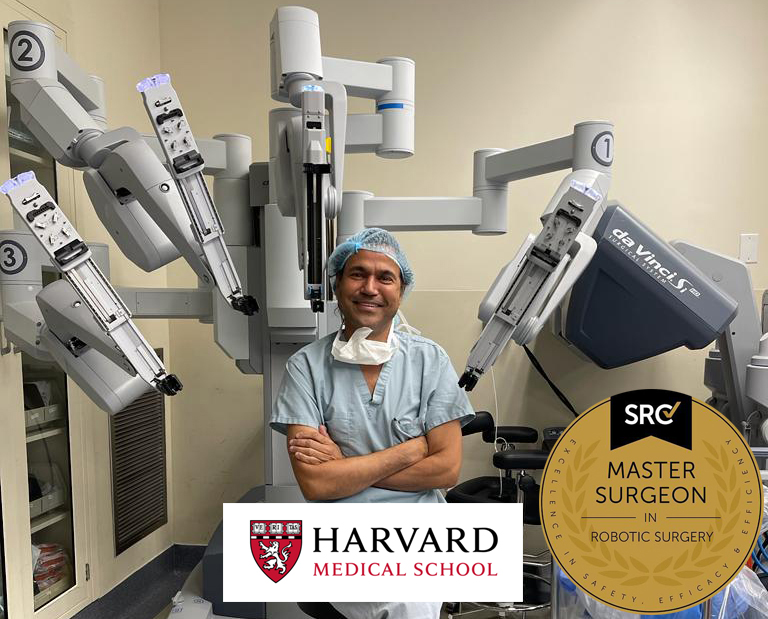Endometriosis Specialist in Long Island
Endometriosis can infiltrate nearby organs like the bowel and urinary bladder, close to the uterus.
Endometriosis is a chronic medical condition that primarily affects individuals with female reproductive systems, where tissue similar to the lining of the uterus (endometrium) grows outside the uterus. This abnormal tissue growth can occur on various pelvic organs, such as the ovaries, fallopian tubes, and the lining of the pelvic cavity, leading to a range of debilitating symptoms. Common signs of endometriosis include severe pelvic pain, painful menstruation, painful intercourse, and in some cases, fertility issues. The exact cause of endometriosis is not well understood, and while there is no cure, various treatment options, including medication, surgery, and lifestyle changes, can help manage the condition and alleviate symptoms, improving the quality of life for those affected.
Early diagnosis and management are crucial in addressing endometriosis effectively. Delayed or misdiagnosis can lead to worsening symptoms and complications. It is essential for individuals experiencing symptoms of endometriosis to consult with a healthcare professional for proper evaluation and personalized treatment options to manage this often painful and disruptive condition.
If you’d like to schedule an appointment at our gynecology offices in Long Island New York, please feel free to reach out and make a request.
What is an Endometriosis Specialist?
An endometriosis specialist is a highly trained medical professional with expertise in the diagnosis, treatment, and management of endometriosis—a complex and often painful gynecological condition. These specialists are typically gynecologists who have undergone additional specialized training or have extensive experience in dealing with endometriosis patients. Their in-depth knowledge of the disease allows them to provide comprehensive care tailored to the individual needs of patients.
Endometriosis specialists are skilled in various diagnostic techniques, including laparoscopy, and they can accurately identify and stage the extent of endometriotic tissue growth within the pelvic region. Once diagnosed, they develop personalized treatment plans that may involve medication, hormonal therapies, minimally invasive surgeries, or, in some cases, more extensive surgical procedures. These specialists are not only focused on alleviating pain and managing symptoms but also on addressing potential fertility issues that can result from endometriosis.
Overall, an endometriosis specialist plays a critical role in improving the quality of life for individuals affected by this challenging condition by offering specialized care and support.
Symptoms of Endometriosis
Endometriosis is characterized by a range of symptoms that can vary in severity among individuals. One of the most common signs is pelvic pain, which often intensifies during menstruation but can persist throughout the menstrual cycle. This pain may manifest as severe cramping, lower abdominal discomfort, or lower back pain. Some individuals also experience pain during or after sexual intercourse, as well as pain during bowel movements or urination, especially if endometriosis has affected nearby organs like the bowel or bladder.
Menstrual irregularities, such as heavy or prolonged periods, are another hallmark of endometriosis. Some individuals with endometriosis may also struggle with fertility issues, as the condition can lead to the formation of scar tissue and adhesions in the pelvic region, potentially affecting the function of the ovaries or fallopian tubes. Fatigue, digestive issues, and, in rare cases, chest pain or coughing up blood during the menstrual cycle may also be associated with more advanced stages of endometriosis. Early recognition and diagnosis of these symptoms are crucial for timely intervention and management of the condition.
Diagnosis of Endometriosis
Diagnosing endometriosis can be a complex process that often requires the expertise of a skilled healthcare provider, typically a gynecologist or an endometriosis specialist. The diagnosis typically begins with a thorough medical history and a discussion of the patient’s symptoms. Symptoms such as chronic pelvic pain, painful menstrual periods, painful intercourse, and fertility issues are significant indicators that prompt further evaluation.
A definitive diagnosis of endometriosis is usually confirmed through a surgical procedure called laparoscopy. During this minimally invasive surgery, a small incision is made near the navel, and a thin, flexible tube with a camera (laparoscope) is inserted into the abdomen to visualize the pelvic organs. If endometriotic lesions are observed, tissue samples may be collected for biopsy to confirm the diagnosis. This surgical approach allows for both diagnosis and, in some cases, simultaneous treatment by removing or cauterizing the endometriotic tissue. While laparoscopy is considered the gold standard for diagnosing endometriosis, healthcare providers may sometimes use imaging studies like ultrasound or MRI as complementary tools to assess the extent of the disease or to rule out other conditions. Early diagnosis is crucial to initiate appropriate treatment and symptom management for individuals with endometriosis.
Endometriosis Treatments
Treatment for endometriosis focuses on managing symptoms and improving the quality of life for individuals affected by this chronic gynecological condition. The approach to treatment can vary based on the severity of symptoms, the extent of endometriotic tissue growth, and the patient’s reproductive goals.
Commonly used treatments include pain relief through over-the-counter or prescription pain medications, hormonal therapies such as birth control pills or hormone-releasing IUDs, which can help control menstrual pain and reduce the growth of endometrial tissue, and minimally invasive surgery (laparoscopy) to remove endometriotic lesions and adhesions. In more severe cases or when fertility is a concern, more extensive surgical procedures or assisted reproductive technologies like in vitro fertilization (IVF) may be considered. Lifestyle modifications such as dietary changes, regular exercise, and stress management can also complement medical treatments. The choice of treatment is highly individualized and should be discussed with a healthcare provider to address the unique needs and goals of each patient. Early diagnosis and a multidisciplinary approach to care involving gynecologists, pain specialists, and fertility experts can significantly improve the management of endometriosis.
Frequently Asked Question (FAQs)
Is there a cure for endometriosis?
Currently, there is no cure for endometriosis, but there are various treatment options available to manage symptoms. These treatments may include medications, hormonal therapies, lifestyle changes, and surgery. The choice of treatment depends on the individual’s specific circumstances and goals.
Can endometriosis affect fertility?
Yes, endometriosis can impact fertility. The extent and location of endometriotic tissue growth can interfere with the function of the ovaries, fallopian tubes, and the uterus, making it more difficult for some individuals to conceive. However, with proper medical management and fertility treatments, many people with endometriosis can still achieve pregnancy.
What lifestyle changes can help manage endometriosis?
Lifestyle changes that may help manage endometriosis include maintaining a balanced diet, regular exercise, stress reduction techniques, and getting adequate sleep. Additionally, some individuals find relief from symptom exacerbation by avoiding certain foods or triggers that worsen their symptoms. It’s essential to discuss lifestyle modifications with a healthcare provider as part of a comprehensive treatment plan.

- New York Gynecology Endometriosis
- Contact Info:
-
375 E. Main Street,
Suite 7, Bay Shore,
Long Island, NY 11706 - (631) 533-9733
The Best Endometriosis Specialist in Long Island
Master Surgeon in Robotic Surgery
Dr. Pankaj Singhal, a globally recognized endometriosis surgeon in Long Island New York, possesses over 25 years of expertise in laparoscopic excision surgery, enabling him to tackle even the most challenging endometriosis cases with confidence. Dr. Pankaj treats patients with diverse endometriosis-related conditions, ranging from ovarian endometriomas to severe deep infiltrating endometriosis that affects the bowels and other organs.
Dr. Pankaj prioritizes minimally invasive surgery and provides comprehensive personal care. Additionally, he is the owner and founder of New York Gynecology and Endometriosis (NYGE), and has dedicated his life to advocating for, respecting, and treating women suffering from this little-known disease. He is one of the few surgeons in the entire United States who have completed over 5,718 robot-assisted gynecologic surgeries.

We Accept Most Major Insurance Plans
Convenient Billing Options for Comprehensive Coverage.
Surgeries are typically covered by health insurance. However, the extent of coverage can vary depending on the specific insurance plan and policy. Some insurance plans may cover a broad range of surgical procedures, including both elective and necessary surgeries, while others may have limitations or exclusions for certain procedures.
In some cases, certain insurance plans or programs may fully cover the cost of surgery, leaving the patient with no financial responsibility.
Request an Appointment with
New York Gynecology Endometriosis
"*" indicates required fields
